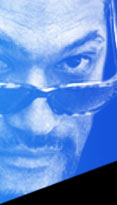 "Flying Fish"
"Flying Fish"
Actor, writer and now director – Laurence Fishburne is in full artistic soar
Written by Paul Chutkow
Photographs by Michael O'Neill
Laurence Fishburne is growing impatient. For
more than half an hour, on this gorgeous morning in Manhattan,
he's been drinking coffee, eating chicken sandwiches and talking.
Talking about his parents. About his boyhood in Brooklyn.
About his recent work in The
Matrix and about his latest creative charge: writing
and directing. This is all important, fascinating ground and
Fishburne is happy to go over it. But it's not enough. Fishburne,
as one can tell from his work, is a man who demands precision.
Sharp edges. Clarity. He wants to go deeper, he wants to cut
through all the externals and go straight to the core. So
now, leaning forward, eyes blazing, Fishburne reaches out
and touches it, he places the tip of his finger on the exact
spot where his life, his work, his entire being snapped into
focus.
It was on that boat, that battered little gunboat,
edging its way upriver, edging deeper and deeper into the
wilds of Vietnam, edging closer and closer to that murderous
rendezvous with the man named Kurtz. It was more than 20 years
ago, but for Fishburne everything from that boat remains vivid
and huge, painted in bold, primeval colors that will never
fade or lose their magic: Brando.
Martin Sheen. Robert
Duvall. Dennis
Hopper. Sam Bottoms. Frederic Forrest. Francis Ford Coppola.
Apocalypse
Now. In Fishburne's mind, they're all still there
together, on the boat or on the set: his comrades and mentors,
taking in hand a raw, gawky 16 year old kid and passing him
the flame."

